[Sidenote: Hill’s Text.]
P) As ye be co_m_avnded, so do ye algate;
120
be not cavseles fro the
table absente;
yt ys a grete pleasure to the high
estate[1]
[Sidenote 1: noble, lord.]
To se his s_er_vaunttes abowte
hy_m_ presente.
havnte no halke, for the_n_
ye will[e] be shente; 124
lette maner_e_
& mesure be yo_u_r gydes twayne;
so shall[e] ye
best please, I dare savely sayne.
P) Reward also thy loke & contenavnce,
Off yo_u_r master or of yo_u_r
soverayne, 128
so shall[e] ye best p_re_ve what ys his
plesavnce
or ell_is_ his dysplesavnce:
this ys s_er_tayne,
The chere discovereth oftyn
both[e] twayn,
& eke the chere
su_m_tyme may yow addresse 132
In thyn_gis_ the
langage may not the_n_ expresse.
[Sidenote: ffl C lxj, back.]
P) And that ye here, loke ye kepe always secre;
besy reporte, of myschefe
ys chese noryse;
Mykyll[e] langage may not all[e] fawtles
be; 136
The_n_ do, my chyld, as techeth
you the wyse
whiche vnto you this
lessu_n_ doth devyce:
here & see, &
be styll[e] in eu_er_y prees,
passe forthe yo_u_r
way i_n_ scilence & i_n_ pees. 140
CAXTON’S TEXT.
[18]
As ye be comanded_e_ / so do ye algate
Be not causeles / fro the table absent
[Sidenote: Don’t absent yourself from table,]
It is a grete plesure / to the hyghe estate
122
To see his seruantis aboute hym present
Haunte no halke / for the_n_ne ye wil be shente
[Sidenote: or stick yourself in a corner.]
Lete maner & mesure / be your gydes tweyne
[Sidenote: Let Manners and Moderation guide you.]
So shal ye best plese / I dar sauely seyne
126
[19]
[Sidenote: Leaf 4 a.]
Rewarde also the loke and_e_ contenaunce
Of your maister / or of your souereyne
[Sidenote: Look at your master’s face;]
So shal ye best preue what is his plesa[=n]ce
129
Or els displesaunce / this is soth serteyne
[Sidenote: that’ll show whether he’s
pleased or not.]
The chere discouerith / often bothe tweyne
And eke [th]^e cher_e_ / somtyme may you addresse
In thi_n_gis / [th]^t la_n_gage may not them expresse
133
[20]
And_e_ that ye her loke / kepe alway secree
[Sidenote: Keep secret all you hear.]
Besy reporte / of mischief is chief noryse
Mykyl langage / may not al fawtles bee
136
Then_n_e do my childe / as techeth you the wyse
Whiche vnto you / this lesson doth deuyse
Here and see / and_e_ be styll_e_ in euery prees
Passe forth your way in scilence & in pees
140
[Sidenote: Hear, see, and go your way.]




